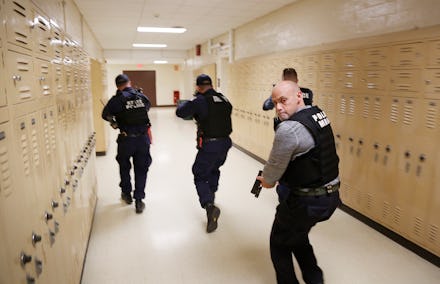Of course active shooter drills are wreaking havoc on kids' mental health

One of the most damning indictments of modern American society is the fact that school shootings have become so common that educational institutions across the country have — for years — instituted "active shooter drills" to teach an entire generation of children how best to survive an attack on their classroom. It's a normalizing exercise that has conditioned thousands if not millions if students to accept school shootings as somehow an unavoidable fact of life.
Perhaps, then, it comes as little surprise that the very exercises meant to mitigate a worst-case scenario are themselves evidently responsible for a significant increase in detrimental effects on the children who endure them.
According to a new study released Thursday by the Georgia Institute of Technology’s Social Dynamics and Wellbeing Lab in partnership with Michael Bloomberg's gun control group Everytown for Gun Safety, the deleterious psychological effects of active shooter drills among school children are both widespread and severe.
By analyzing social media posts from students at more than 100 elementary, middle, and high schools across 33 states this past year, researchers with Georgia Tech determined:
Active shooter drills in schools are associated with increases in depression (39%), stress and anxiety (42%), and physiological health problems (23%) overall, including children from as young as 5 years old up to high schoolers, their parents, and teachers. Concerns over death increased by 22%, with words like blood, pain, clinics, and pills becoming a consistent feature of social media posts in school communities in the 90 days after a school drill.
"It wasn’t just a short duration that everybody shakes off — it's having a lasting impression," Everytown research director Sarah Burd-Sharps told NBC News, which was shown an early draft of the study.
Given that the majority of states now mandate active shooter drills, and coupled with the relatively infrequent instances of actual school shootings, the question becomes whether widespread drills — which occasionally go so far as to use live pellet guns to approximate real firearms — are the source of more harm than benefit.
Earlier this year, Everytown partnered with the American Federation of Teachers and National Education Association, the country's two largest teachers unions, to call for an end to active shooter drills. The coalition argued that training teachers specifically to address school shootings would be more effective than subjecting students to the exercises. In its latest study, Everytown also recommends a series of concrete steps that it suggests might mitigate the harmful effects of active shooter drills, including notifying students and parents ahead of time, enacting any drills "with trauma-informed approaches to address students’ wellbeing both during the drills, and over a sustained period thereafter," and ensuring that drills don't "include simulations that mimic an actual incident."
It's just another example of how America's approach to mass shootings — do little to prevent them, and instead focus on how to react to them as an inevitability — is failing the most vulnerable among us.